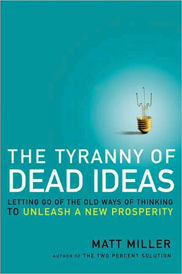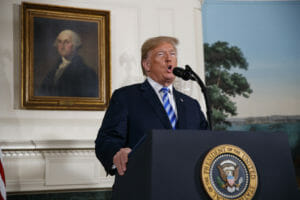Jonathan Shapiro on ‘The Tyranny of Dead Ideas’
Matt Miller, a host of KCRW’s “Left, Right & Center,” has written a book full of necessary honesty and courage -- a welcome effort to rid us of the nostrums and shopworn notions that cloud our thinking and constrain our politics.
is a one-man economic stimulus package.
His ambitious new book, “The Tyranny of Dead Ideas: Letting Go of the Old Ways of Thinking to Unleash a New Prosperity,” has more intriguing proposals packed into it than might be found in a month of congressional debates. Whatever the book lacks in deep analysis, it more than makes up for in intellectual honesty and courage. Miller acknowledges that our problems are vast and systemic and, thus, the solutions will not come in half measures. Yet most refuse to admit it.
“America’s economy is about to face its most severe test in nearly a century … [yet] our business and political leaders are doing next to nothing to prepare us to cope with what lies ahead,” Miller writes.
The proof is in their actions. Bailing out banks or the auto industry and spending billions in federal funds to create jobs may stave off insolvency and curtail unemployment, but these are fundamentally short-term responses to long-term problems. Even more worrying, such actions prove that our leaders continue to rely on old economic models that are no longer viable or even relevant.
The first step, Miller argues, is to recognize that “our entire economic and political culture remains in thrall to a set of `Dead Ideas’ about how a modern economy should work.”
The problem is not in the stars, or even our institutions, but rather in our heads. Because we have failed to grasp how the world’s economy has changed in the last 20 years, our systems of education, resource allocation and public policy have failed to serve our needs.
Miller lists the dead ideas that cloud our thinking:
While current thinking about the American economy is hardly monolithic, the individuals who occupy its most influential positions subscribe to certain key premises:
- our children will earn more than we do
- free trade is “good” no matter how many people it hurts
- employees should play a central role in the provision of health coverage
- taxes hurt the economy
- “local control” of schools is essential
- people tend to end up, in economic terms, where they deserve to
… And therein lies the dilemma: from the halls of government to the executive suite, from the corner store to the factory floor, Americans are in the grip of a set of ideas that are not only dubious or dead wrong — they’re on a collision course with social and economic developments that are now irreversible.
|
To see long excerpts from “The Tyranny of Dead Ideas,” click here. |
In this allegedly bipartisan age, where good ideas are supposed to trump ideology and politics, Miller is precisely the type of thinker we need. Smart, independent and reformist, Miller plays center in KCRW’s “Left, Right & Center” with élan.
Radically centrist, Miller is a reformer in the tradition of Richard Hofstadter. Sworn to no party, his only allegiance is to smart, effective business and government. If only the nation hired philosopher-kings, Miller would never be out of a job. And we would all be better for it.
This is not to suggest Miller merely embraces change for its own sake. Miller’s hoped-for return to old-fashioned values, harkening to a time when America used the stocks instead of investing in them, makes good sense. Bringing Puritan principles to bear on Wall Street would have served us well. How much better it would have been for the directors of AIG, hedge funds or banks to be governed by notions of thrift, moderation and humility.
Nor does Miller pretend to have all the answers. His gift is to ask the big questions:
“Why are business leaders afraid or unwilling to say that we need government to play a bigger role in health care? How can top officials and their advisors call constantly for tax cuts when trillions in unpaid bills are coming due? Why do politicians pledge to ‘leave no child behind’ while overseeing public school systems that systematically assign the worst teachers and most rundown facilities to the poor children who need great schools the most? Why do free trade losers get only lip service from those elected representatives who say that workers are getting the shaft?”
Such questions are well worth asking. They force us to consider mitigating the negative consequences of unchecked greed without compromising our capitalist system. They suggest why we should alter the role government plays in regulating business. They make us consider what responsibilities the private sector should assume in regard to health care and education. Miller admits such questions are daunting. But they must not scare us into denying the issues they represent. While others see only economic calamity, Millers sees a teachable moment.
“It takes an extraordinary shock to expose the conventional wisdom as obsolete, and to open people’s minds to a new version of what is possible and what is necessary.” This, Miller writes, is such a time.
Always thought-provoking, never dull, Miller’s ideas are far-reaching and ambitious. They cover, among others things, the need to modify our tax policies, ways to reform our health care and educational policy, and what we could learn from other nations regarding how to revive our banking industry. When the house is on fire, you don’t want to cavil about how the firemen intend to put it out. Miller tries hard to identify and explain what’s wrong about many of our economic notions, and what should be done to change them. Volumes of books and studies might be devoted to any one of Miller’s many proposals. That he discusses so many so intelligently is impressive. Yet not even Miller, a nimble intellect, can give adequate context or analysis to the issues he raises. The book is always entertaining, yet there is only so much that can be done in 272 pages. At times, it is frustratingly short on detail.
Yet if the diversity of Miller’s ideas sometimes feels random, or the volume of ideas comes at the cost of cogency, similar criticisms have been leveled against President Obama’s multifaceted approach. No doubt such criticisms miss a greater point. We do not have the luxury to think about only one thing at a time. The current crisis — really a series of related problems — demands a series of complex and innovative solutions. These will be produced only when our leaders, inspired by thinkers like Miller, think in new ways. Quibble as one might at Miller’s idiosyncratic treatment strategy, he deserves credit for diagnosing the problem, and recognizing that nothing less than extraordinary measures are needed if the patient is to recover.
That Miller manages to be enlightening and entertaining while at least probing fundamental theories of public policy is impressive. You may not agree with all of Miller’s opinions, but you have to admire his effort to encourage meaningful debate over how to fix the current mess and remake the economy so that such a crisis never happens again.
If only the Obama administration would frame the issues as clearly as Miller does, we could actually have a national discussion on what Americans can expect from their government in regard to health care and public education, access to credit, and financing for affordable housing and business opportunities; in short, all the disparate yet connected institutions and services that Miller correctly identifies as composing and affecting what we mean when we discuss that scary monster called “the economy.”
|
Jonathan Shapiro, a former federal prosecutor, teaches law as an adjunct professor at USC and writes and produces the NBC TV drama “Life.” |
Independent journalism is under threat and overshadowed by heavily funded mainstream media.
You can help level the playing field. Become a member.
Your tax-deductible contribution keeps us digging beneath the headlines to give you thought-provoking, investigative reporting and analysis that unearths what's really happening- without compromise.
Give today to support our courageous, independent journalists.







You need to be a supporter to comment.
There are currently no responses to this article.
Be the first to respond.